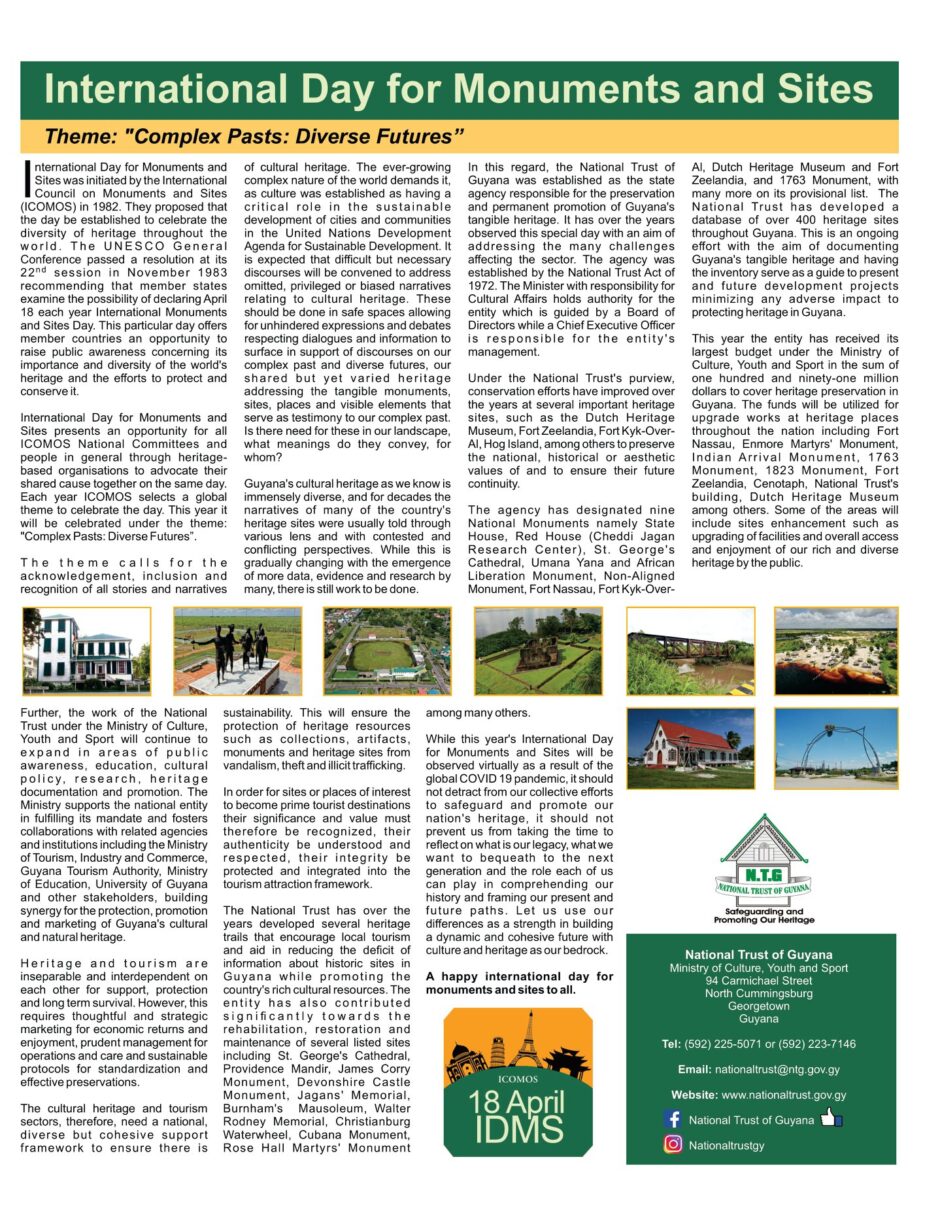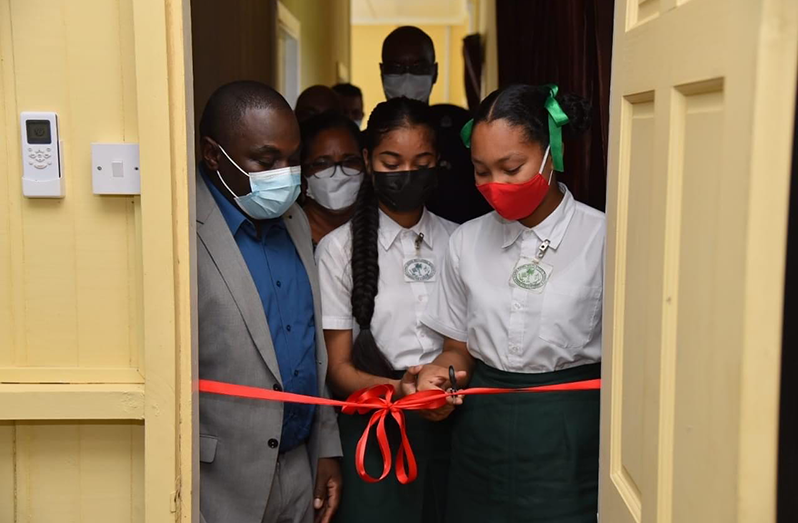
World day for Safety and Health
Source: Guyana National Broadcasting Authority (GNBA)

Source: Guyana National Broadcasting Authority (GNBA)

ENHANCED virtual education is expected soon, as the Ministry of Education has convened training for 1,000 teachers and procured over 1,000 devices to supplement this effort.
The initiative, which costs $174M, is being executed through a collaborative effort among the ministry, the Global Partnership for Education (GPE), and the United Nations Children’s Fund (UNICEF). The launch of this latest project was streamed live from the Ministry of Education’s Facebook page, on Tuesday.
Of the 1,022 devices purchased by the ministry, 1,000 will go towards Grade Seven teachers for the benefit of enhanced engagement with their students, and the other 22 are expected to be given to education officers so they could monitor the project. Sixty of those teachers will be ‘master’ trainers who will, in turn, teach the rest.
The services of UK-based Tablet Academy International have been secured through an open bidding process, according to Education Minister, Priya Manickchand, and the acquisition of laptops for teachers has also been done in the same process.

The ‘Tablet Academy’, an internationally recognized independent company, which offers consultancy, teacher-training, and student engagement services to the education sector, will be providing training to the teachers locally. According to the company’s Chairman and Co-founder, Steve Molyneux, who was present at the launch yesterday, the firm trains over 36,000 teachers each year, supports over 1,500 schools and provides learners with STEM enrichment workshops, all delivered remotely.
In delivering remarks, Manickchand noted that improving Information Communications Technology (ICT) became one of the government’s biggest priorities after it took office and with the onset of the coronavirus pandemic. “COVID-19 showed us in Guyana that using technology in the classroom to deliver education was a growing trend that would become important; it showed us how unprepared we were to meet anything else but the traditional method of delivering education,” she said.
Further, she added: “Regardless of how much had been invested, the fact that we had not prepared for the type of school where we would have to deliver education with most of our children and teachers being outside of the classroom in their living rooms; COVID-19 showed us how very unprepared we were.”
The ministry has since looked at every possible way of delivering education in an untraditional way to the country’s student population of 170,000, and has taken giant steps in refashioning the learning channel, using the radio, and writing, printing and distributing worksheets in record time.
“The process of writing usually takes months, sometimes years and we did it in a few weeks,” she reasoned.
She was keen to point out that not just any teacher will be able to receive the devices, but only those who meet a strict criterion that is in place. She said that the introduction of technology will not stop when COVID-19 is finished, but that it will be fully incorporated into the system so that the education sector can be more effective at every level.
Director of the National Centre of Educational Resources Development (NCERD), Quenita Walrond, was also present at the launch, along with Deputy Chief Education Officer, Volika Jaikishun. “
We take a further leap towards a holistic approach to technological innovation, utility and support in the sector. Utilising the technology, teachers can collaborate with each other, their students, their departments and even central ministry at a few clicks,” Walrond said of the project, adding: “Today signifies a departure from the sole reliance on the movement and collection of paper for knowledge-building and information sharing.” Walrond offered that this online platform will utilise Microsoft Office 365 for education and that this initiative is a component of the COVID-19 Accelerated Funding Project (AFP), which seeks to support the continuity of learning for children across Guyana.
“The COVID AFP across its components seeks to provide the hardware, infrastructure, and supporting education through capacity building that will enable educators to deliver to and for their students, quality education inputs and experiences that are in sync with modernised delivery modes and the ability to better communicate with students,” she related.
She said that this project seeks to allow for the provision of an integrated online platform for teachers, principally for delivery of the curriculum, but with many other capabilities and applications.

Source: The National Trust of Guyana

Bridgetown, Barbados April 15, 2021 – CDEMA deployed a Detailed Damage Sectoral Analysis (DDSA) team on April 14, 2021 in support of the humanitarian efforts in St. Vincent and the Grenadines following the explosive eruptions of La Soufriere volcano that commenced on April 9, 2021. The DDSA team will support the government by providing an assessment of key sectors and guidance towards estimating needs and associated costs, which will inform the relief and recovery efforts.
The team, which is being led by CDEMA, will specifically examine the agriculture, health and water sectors, which have been prioritized by St. Vincent and the Grenadines. Within four days the DDSA team will provide a consolidated picture of the status of the three sectors and their evolving needs. Team members include specialists from the Caribbean Public Health Agency (CARPHA), Caribbean Agricultural Research and Development Institute (CARDI), Caribbean Electric Utility Services Corporation (CARILEC), Caribbean Media Corporation (CMC), Regional Security System (RSS), Food and Agriculture Organization of the United Nations (FAO), Pan American Health Organization (PAHO) and United Nations International Children’s Emergency Fund (UNICEF).
During a national press conference in Barbados on April 14, 2021, CDEMA Acting Executive Director, Ms. Elizabeth Riley explained, “the intent of that team is to support the government in providing an assessment or snapshot of where certain key sectors are at this stage and we want to thank the [organizations]… who readily provided persons to support these teams.”
Ms. Riley also announced the upcoming deployment of the CARICOM Disaster Relief Unit (CDRU) team, which is coordinated through the Regional Security System (RSS), to provide support with relief management operations in St Vincent, principally at the sea port. The general public has been advised to coordinate relief supplies with the National Disaster Office in their respective country to assist in the coordination and tracking of relief items. Cash donations are also being encouraged through accounts established for direct donations to St. Vincent and the Grenadines La Soufriere relief efforts and the regional disaster response fund.
Cash donations may be made through CDEMA
For further information, please contact:
Andrea Austin
Communication and Public Relations Specialist
CARIBBEAN DISASTER EMERGENCY MANAGEMENT AGENCY (CDEMA)
Resilience Way, Lower Estate

Source: Guyana Chronicle
Radio Essequibo launched at Cotton Field
– Minister McCoy urges business community to take advantage
MINISTER of Public Affairs within the Office of the Prime Minister, Kwame McCoy, on Monday launched Radio Essequibo, 95.5 FM.
The station, which is now fully operational, offers sponsored local programmes, advertisements, death announcements, and greetings designed for entertainment, educational, religious, and developmental purposes.
Minister McCoy said that the launching was testimony to the fact that the PPP/C administration has always been, and continues to be fully committed to ensuring that citizens are able to exercise their constitutional and fundamental human right to freedom of expression.
“Today, we proudly unveil the addition of necessary human capacity to facilitate local broadcast content designed to educate and inform on developments in Guyana’s largest county, Essequibo,” McCoy said.
According to the minister, Essequibians will now be able to contribute to relevant discussions on specific programmes and give views on issues that matter to them the most.
During his address, he mentioned that the radio station will cover 53 kilometres radius and will be a major conduit of information throughout the coast and in the Pomeroon River.
He, therefore, urged members of the business community to take advantage and to use the station to promote their businesses or local products.
Shedding some light on the work of the Prime Minister’s office, he said within two months of him taking up the ministerial position there was a formal announcement of a total and complete liberalisation of the telecommunication sector, effectively ending decades of commercial monopoly.
He said among the visions of the office is the provision of better access to information in the hinterland. He asserted that “short wave” radios will be provided to households and maintenance training done across the communities. He said independent indigenous content creation for community radio stations through youth and community groups will be facilitated.
Board Chairman of the National Communications Network (NCN) Raymond Cummings, in his remarks, said the launch paves a new opportunity for residents to listen to the news and other events happening in Essequibo in real-time. He said that the radio station will provide a platform for those persons who have completed communication studies to practise what was learnt and to expand the broadcasting spectrum in the region.
Meanwhile, Region Two Chairperson Vilma De Silva said the launching of “Radio Essequibo” is a historic moment for the region. De Silva said the studio was launched at an opportune time when communication plays an important role during the pandemic. She, therefore, assured the minister and the NCN team that the Regional Democratic Council (RDC) will make full use of the radio station to inform residents of development works occurring within the region.
Regional Executive Officer (REO) Devanand Ramdatt remarked that as a rural region, it is important for there to be access to quality information. He said too that the launching was historic and that the RDC will fully utilise the facility to better inform residents.
The branch manager will be Mohanlall Suellall and the studio will have two freelance broadcasters, Mayor of Anna Regina Rajendra Prabhulall and Indrawattie Natram.
NCN operates seven other regional radio stations within its national broadcasting network. Radio Essequibo 95.5 frequency was launched in November 2019 and the relay station was commissioned in January, 2020, at Cotton Field in the township of Anna Regina, but it was never operationalised.
Also in attendance at the simple launching ceremony were President of the Essequibo Chamber of Commerce and Industry Aadil Baskh; Chief Executive Officer of NCN, Michella Abraham-Ali; Deputy Chief Executive officer of NCN, Neaz Subhan; Regional Vice-Chairman Humace Oodit, and Commander of ‘G’ Division, Crystal Robinson.
